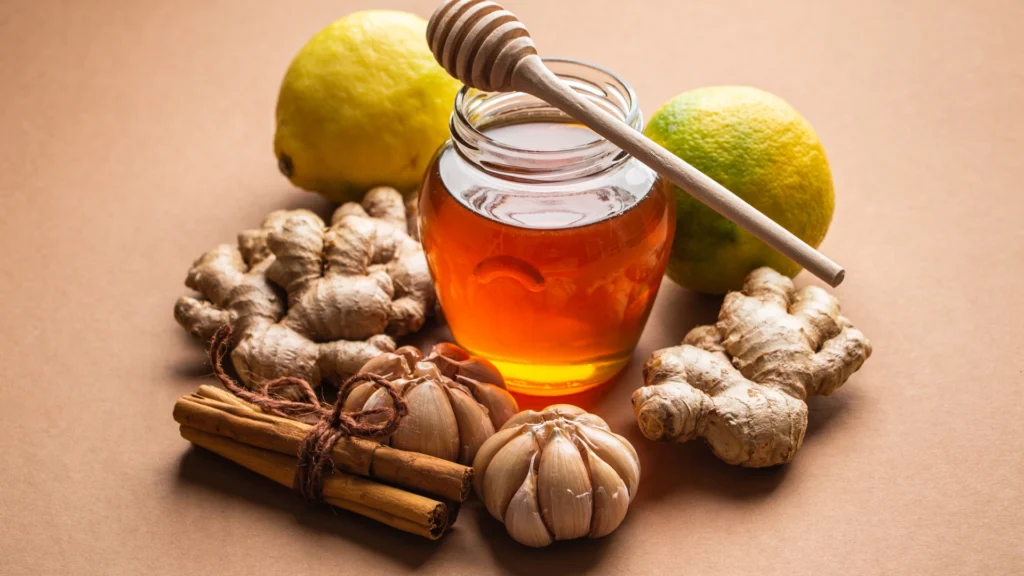
The flu, also known as influenza, is a contagious respiratory illness caused by influenza viruses. It can spread quickly, leading to significant discomfort and, in some cases, life-threatening complications. Each year, the flu impacts millions of lives worldwide. According to the Centers for Disease Control and Prevention (CDC), the flu has resulted in 9.3 million to 41 million illnesses, 100,000 to 710,000 hospitalizations, and 4,900 to 51,000 deaths annually in the United States alone. These staggering numbers highlight how prevalent and severe the flu can be.
While conventional medications like antiviral drugs can help manage symptoms, they often come with unwanted side effects. For many individuals, turning to natural remedies has become a preferred choice. Natural flu treatments help ease symptoms and support the body’s immune system, aiding in faster recovery.
In this article, you will learn natural and effective ways to manage flu symptoms, strengthen your immunity during recovery, and prevent future flu infections.
Flu (Influenza): Causes and Symptoms
The flu is caused by influenza viruses, which are divided into three main types: A, B, and C. Influenza A and B are responsible for most seasonal flu outbreaks, while influenza C typically causes milder respiratory illnesses. These viruses spread through tiny droplets when an infected person coughs, sneezes, or talks, and can also survive on surfaces for several hours, making contact transmission common. Below are some of the causes of the flu:
- Direct Transmission: Being in close contact with an infected person increases the risk of catching the virus.
- Airborne Particles: Influenza spreads through respiratory droplets expelled when an infected person coughs, sneezes, or talks.
- Contaminated Surfaces: Touching infected surfaces and then touching your nose, mouth, or eyes allows the virus to enter your body.
Flu symptoms often appear suddenly and can vary in severity. Common symptoms include:
- High fever (100°F or higher)
- Chills and sweating
- Muscle aches and body pain
- Fatigue and weakness
- Headache
- Dry cough
- Sore throat
- Nasal congestion or runny nose
In some cases, complications such as pneumonia, bronchitis, and sinus infections may develop, especially in high-risk groups like young children, older adults, and individuals with weakened immune systems.
When is Flu Season?
Flu season typically occurs during the fall and winter months, peaking between December and February in most parts of the United States. However, flu activity can begin as early as October and extend into May, depending on the region and environmental factors. The colder temperatures and increased time spent indoors contribute to the rapid spread of the influenza virus. During flu season, people are more likely to be in close contact with others in enclosed spaces, allowing respiratory droplets to travel more easily.
Additionally, the dry air of winter can weaken nasal passages, making it easier for the virus to infect the respiratory system. Flu season’s intensity and duration can vary each year, influenced by the specific influenza strains circulating and overall population immunity.
How common is the flu?
The flu is one of the most widespread illnesses worldwide, affecting millions yearly. In the United States alone, the flu impacts between 3 percent and 11 percent of the U.S. population annually. Globally, it causes 1 billion infections, with 3 to 5 million severe cases and approximately 290,000 to 650,000 deaths. The flu is more common during the peak of flu season when conditions favor the virus’s spread, particularly in colder months.
Certain groups, including young children, the elderly, pregnant women, and individuals with chronic health conditions, are more vulnerable to severe complications. Because of its contagious nature, the flu spreads quickly in schools, workplaces, and households, often overwhelming healthcare systems during its peak.
Types of Flu

Influenza viruses are classified into three main types: Type A, Type B, and Type C, each varying in severity and impact.
- Influenza A: This is the most severe and widespread form of the flu. Influenza A viruses are further divided into subtypes based on two proteins on their surface: hemagglutinin (H) and neuraminidase (N). These subtypes, such as H1N1 and H3N2, are responsible for the most serious flu pandemics and seasonal outbreaks.
- Influenza B: While less severe than Type A, Influenza B can still cause significant illness, particularly during seasonal flu outbreaks. Unlike Type A, Influenza B viruses do not have subtypes but are categorized into two main lineages: B/Yamagata and B/Victoria. These strains primarily impact children and younger individuals.
- Influenza C: This type causes mild respiratory symptoms and is not associated with epidemics or severe illness. It is far less common than Types A and B and generally does not pose a significant public health risk.
The Importance of Natural Remedies for Flu
Natural remedies for the flu have gained popularity due to their ability to address symptoms without the side effects often associated with conventional medications. Over-the-counter drugs like decongestants or fever reducers can sometimes cause drowsiness, nausea, or rebound symptoms, making natural options an appealing alternative. Natural remedies help relieve flu symptoms and support the body’s immune system in fighting the virus by focusing on holistic methods, such as herbal treatments, proper nutrition, and hydration.
One key benefit of natural remedies is their ability to boost immunity naturally. For example, foods rich in vitamin C, such as oranges and bell peppers, help strengthen the immune response, while zinc and elderberry have shown promising effects in reducing the flu’s duration. These remedies provide a comprehensive approach to recovery without adding chemical strain to the body.
Scientific research supports the efficacy of certain natural remedies. For instance, studies have found that consuming elderberry extract during flu infections can reduce symptoms and shorten recovery time by up to 4 days compared to no treatment. Similarly, natural probiotics like yogurt help balance gut health, which is critical in immune defense.
Immediate Steps to Take
When flu symptoms first appear, taking immediate action can significantly reduce the severity and duration of the illness. The most effective initial steps include resting, maintaining proper hydration, and focusing on nutrition to support the immune system and speed up recovery.
Rest and Hydration
Rest is critical for recovery because it allows the body to focus energy on fighting the virus. During rest, the immune system works more effectively to combat infections and repair damaged tissues. Avoid strenuous activities and prioritize sleep to reduce stress on the body.
Staying hydrated is equally important, as the flu can lead to fever, sweating, and nasal congestion, all of which deplete fluids. Proper hydration helps thin mucus, soothe a sore throat, and regulate body temperature. Focus on consuming:
- Water: Plain water is essential to replenish lost fluids.
- Herbal Teas: Teas like ginger, peppermint, or chamomile provide hydration while offering anti-inflammatory and soothing effects.
- Broths: Chicken or vegetable broths are rich in electrolytes and provide hydration and nourishment.
Avoid caffeinated drinks and alcohol, as they can further dehydrate the body.
Proper Nutrition
Eating nutrient-rich foods during the flu helps fuel your immune system and aids recovery.
Here are some foods to Eat:
- Immune-Boosting Soups: Chicken soup is especially beneficial because it contains amino acids like cysteine, which helps loosen mucus.
- Fruits Rich in Vitamin C: Oranges, strawberries, and kiwis can enhance immune function.
- Garlic and Ginger: Garlic has antiviral properties, while ginger reduces inflammation and soothes nausea.
- Probiotic Foods: Yogurt and fermented vegetables promote gut health, which is essential for immune response.
Avoiding certain foods is just as important as eating the right ones, as some foods can worsen symptoms and weaken the immune system. Below are some of the foods to avoid:
- Sugary Foods: Sugar suppresses the immune system and increases inflammation.
- Processed Items: Fast food and processed snacks lack nutrients and can worsen fatigue.
- Dairy (for some people): While not universal, dairy can thicken mucus for some individuals, making symptoms like congestion worse.
Top Natural Remedies for the Flu

Natural remedies can effectively relieve flu symptoms while supporting the body’s recovery process. These remedies are accessible, gentle on the body, and backed by their ability to reduce symptoms without harmful side effects.
Herbal Teas and Supplements
Herbal teas are a cornerstone of natural flu remedies due to their soothing and immune-boosting properties. Teas like ginger, echinacea, and chamomile provide antioxidants, reduce inflammation, and ease throat pain. Ginger tea, for example, helps alleviate nausea and warms the body, while echinacea has been shown to strengthen immune function, helping the body fight the virus. Supplements such as zinc, vitamin C, and elderberry are also effective. Elderberry extract, in particular, has been proven to shorten flu duration by up to 4 days when taken at the onset of symptoms.
Aromatherapy
Aromatherapy involves using essential oils to relieve flu symptoms naturally. Oils like eucalyptus, peppermint, and tea tree are known for their antiviral and decongestant properties. For example, inhaling eucalyptus oil helps open nasal airways and reduce congestion, while peppermint oil provides a cooling sensation that can soothe headaches and sinus pressure. Diffusing essential oils in the home or applying diluted oils on the chest can ease breathing and promote relaxation during flu recovery.
Home Remedies
Home remedies are simple, time-tested solutions that effectively relieve flu symptoms. One common remedy is honey mixed with warm water or herbal tea, which acts as a natural cough suppressant and soothes sore throats. Additionally, a saltwater gargle can reduce throat inflammation and kill bacteria in the mouth. Another effective remedy is using warm compresses on the forehead to ease headaches and reduce sinus pressure. These remedies are easy to prepare, cost-effective, and provide significant relief during flu infections.
Steam Inhalation
Steam inhalation is a natural way to clear nasal congestion and ease breathing. By inhaling warm, moist air, mucus loosens in the airways, allowing for easier drainage. To do this, boil water, pour it into a bowl, and inhale the steam by covering your head with a towel. Adding essential oils like eucalyptus or peppermint enhances the effect by providing antiviral benefits and further reducing inflammation. Steam inhalation reduces sinus congestion, cough, and chest tightness, making it a key remedy for flu recovery.
How to Strengthen Immunity During Recovery
Incorporating natural immune boosters can accelerate recovery. Foods rich in probiotics, like yogurt, kefir, and fermented vegetables, help balance gut bacteria, which is critical in immune function. Additionally, vitamins C, D, and zinc supplement the body with nutrients that combat inflammation and support cell repair. Zinc, in particular, aids in shortening the duration of flu symptoms by improving immune response.
Daily practices also play a vital role in recovery. Light activities such as gentle stretching or yoga improve blood circulation, which helps deliver nutrients and oxygen throughout the body. However, strenuous exercise should be avoided until full recovery. Sleep quality is equally important, as the body repairs tissues and produces immune cells during rest. Aim for 7-9 hours of uninterrupted sleep to ensure the immune system functions effectively.
How to Prevent Flu Naturally
Preventing the flu naturally involves building a strong immune system and adopting practices that reduce exposure to the virus. A balanced diet rich in immune-boosting foods, such as fruits high in vitamin C (like oranges, kiwis, and berries), leafy greens, garlic, and ginger, helps strengthen the body’s defense against infections. Regular physical activity improves blood circulation, which supports the immune response while ensuring proper hydration keeps mucus membranes moist, and is more effective in trapping pathogens.
Preparing your home for flu season can also minimize risk. Using humidifiers adds moisture to the air, reducing the survival time of the flu virus in dry environments, while air purifiers help filter airborne viruses and allergens. Simple hygiene practices, such as frequent handwashing, disinfecting high-touch surfaces, and avoiding close contact with sick individuals, are effective flu prevention methods.
Some people opt for natural vaccination alternatives to mimic immune-strengthening benefits, such as consuming elderberry syrup or fermented foods, which have antiviral properties.
When to Seek Medical Attention
If flu symptoms worsen or persist for more than 7-10 days, it could indicate complications such as pneumonia or bronchitis. Warning signs include a high fever (above 102°F) that doesn’t subside, severe chest pain, persistent shortness of breath, or bluish lips or face, which may signal a lack of oxygen. Other red flags include dehydration, marked by dizziness, confusion, or reduced urination.
For children, watch for rapid breathing, lethargy, and irritability, as their immune systems are less able to handle severe infections. In the elderly or individuals with chronic conditions like asthma, diabetes, or heart disease, flu complications can escalate quickly, requiring immediate intervention. If vomiting, extreme fatigue, or sudden worsening occurs, medical care should be sought promptly.
Practical Tips for Families

For children, natural remedies like honey (for children over 1 year old) can soothe a cough, during the warm chicken soup, and plenty of fluids aid recovery. Make flu remedies fun by offering fruit smoothies rich in vitamin C or herbal teas with a bit of honey.
To keep the household flu-free, encourage frequent handwashing, disinfect shared surfaces like doorknobs and toys, and teach children to cough or sneeze into their elbows. Regularly ventilating the home by opening windows and using air purifiers can reduce airborne viruses.
For elderly family members, keep them hydrated and warm, as they are more vulnerable to flu complications. Offering nutrient-dense foods like broth, steamed vegetables, and immune-boosting drinks can aid recovery while ensuring they rest adequately.
A Word on Holistic Medicine
Holistic medicine takes a comprehensive approach to flu treatment, addressing symptoms and the root causes of infection vulnerability. Integrative therapies, such as acupuncture, herbal treatments, and homeopathy, strengthen the body’s natural defenses and promote balance. For instance, herbal remedies like elderberry, echinacea, and ginger are commonly used in holistic medicine to reduce flu severity and duration.
Holistic practitioners emphasize lifestyle changes, including stress management, sleep improvement, and nutrient-rich diets, to create a foundation for long-term health and flu prevention. Techniques like aromatherapy using essential oils or steam inhalation help ease respiratory symptoms naturally, providing relief without side effects.
Is It Possible to Get Rid of the Flu in 24 Hours Naturally?
While natural remedies can significantly reduce flu symptoms and support recovery, it is not realistic to completely eliminate the flu in 24 hours. The flu virus typically runs its course over 7-10 days, with the first 2-3 days being the most intense. However, taking immediate action at the onset of symptoms can shorten the duration and make the flu more manageable.
Natural remedies like elderberry syrup, ginger tea, and vitamin C can help boost immunity and quickly reduce symptoms. Resting, staying hydrated, and eating nutrient-rich foods like broth and citrus fruits can accelerate healing. While a full recovery takes time, starting natural treatments early can make a noticeable difference in symptom severity within the first 24 hours.
What Are the Most Effective Natural Flu Remedies?
Elderberry extract is among the most proven remedies, with studies showing it can shorten flu duration by up to 4 days when taken early. Elderberry contains antiviral properties that inhibit the flu virus from spreading in the body.
Ginger and garlic are also powerful natural flu fighters. Ginger helps reduce inflammation, ease nausea, and warm the body, while garlic contains allicin, a compound with strong antiviral and immune-boosting properties. Drinking herbal teas, such as echinacea or peppermint, provides antioxidants and soothes sore throats.
Honey is another effective remedy, acting as a natural cough suppressant and soothing throat irritation. Consuming vitamin C-rich foods, like oranges, kiwi, and bell peppers, supports immune function and reduces the severity of symptoms. Finally, staying hydrated with water, broths, and herbal teas ensures the body can flush out toxins and recover effectively.
Can Vitamin C Prevent Flu?

Vitamin C is a powerful antioxidant critical in strengthening the immune system, but it cannot completely prevent the flu. While it does not act as a shield against the influenza virus, research shows that regular intake of vitamin C-rich foods or supplements can reduce the severity and duration of flu symptoms.
For example, consuming 200 mg or more of vitamin C daily helps enhance immune cell function, allowing the body to fight infections more effectively. Foods like oranges, strawberries, bell peppers, and kiwi are excellent natural sources. While vitamin C may not stop the flu virus entirely, it supports the immune response and aids recovery when taken consistently.
How Does Garlic Help With Flu Symptoms?
Garlic is a well-known natural remedy for the flu due to its antiviral, anti-inflammatory, and immune-boosting properties. It contains allicin, a sulfur-containing compound released when garlic is crushed or chopped. Allicin has been shown to combat viruses, including influenza, by inhibiting their replication ability. Garlic also stimulates the immune system, increasing the production of white blood cells, which help fight infections.
Consuming raw garlic or adding it to warm broths and soups can ease congestion, reduce inflammation, and relieve flu symptoms like sore throat and body aches. Its natural warming effect also helps the body recover more efficiently.
Are There Any Risks to Using Echinacea as a Flu Remedy?
Echinacea is a popular herbal remedy that boosts immunity and reduces flu symptoms. While studies suggest echinacea can shorten the flu’s duration at its onset, it may carry some risks, especially for certain individuals. Potential side effects include allergic reactions, particularly in people with plant allergies or asthma.
Those with autoimmune conditions should avoid echinacea, which can overstimulate the immune system. Additionally, some people may experience nausea, dizziness, or mild stomach discomfort when taking echinacea supplements. It is generally safe for short-term use, but it’s important to monitor for adverse reactions and use it cautiously.
How Often Should I Take Honey for Flu Relief?
Honey is a natural and effective remedy for soothing flu symptoms, particularly cough and throat irritation. It acts as a cough suppressant with antimicrobial properties that can reduce throat inflammation. For best results, take 1 to 2 teaspoons of raw honey every few hours. Mixing honey with warm water, herbal teas, or lemon juice enhances its effectiveness by providing additional hydration and soothing properties.
Honey is safe for adults and children over 1 year old, but it should be avoided in infants due to the risk of botulism. Regular consumption of honey during the flu can provide noticeable relief from persistent coughing and sore throat.
Can Ginger Tea Reduce Flu Symptoms?
Yes, ginger tea is highly effective in reducing flu symptoms due to its anti-inflammatory, antiviral, and warming properties. Ginger contains compounds like gingerol and shogaol, which help reduce inflammation, ease nausea, and relieve muscle aches often associated with the flu. Drinking ginger tea increases body warmth, promotes sweating, and naturally helps the body eliminate toxins. It also soothes a sore throat and loosens mucus, making expelling easier. For optimal benefits, drink 2 to 3 cups of ginger tea daily during flu recovery. Adding honey and lemon to ginger tea further enhances its soothing and immune-boosting effects.
What Is Elderberry, and How Does It Help With Flu?
Elderberry is a fruit from the Sambucus plant that has been used for centuries as a natural remedy for viral infections, including the flu. Elderberries are rich in antioxidants and contain compounds that have been shown to inhibit the influenza virus from spreading within the body.
Scientific studies indicate that elderberry extract can shorten the duration of flu symptoms by up to 4 days when taken early in the infection. Elderberry enhances the immune response and reduces inflammation, relieves fever, body aches, and congestion. It can be consumed as syrup, tea, or supplements, making it a versatile and effective natural remedy.
Are Natural Flu Remedies Safe for Children?
Most natural flu remedies are safe for children when used appropriately, but care should be taken with specific ingredients. Remedies like honey are highly effective for soothing coughs but should only be given to children over 1 year old due to the risk of botulism. Warm broths, vitamin C-rich fruits, and herbal teas like chamomile are gentle and safe options for children to alleviate flu symptoms naturally.
However, certain herbs like echinacea or essential oils should be used cautiously, as they may cause allergic reactions in some children. Always opt for age-appropriate remedies, ensure proper hydration, and monitor flu symptoms closely to avoid complications.
Can I Use Essential Oils to Treat Flu Symptoms?

Yes, essential oils can effectively relieve flu symptoms when used properly. Eucalyptus, peppermint, tea tree, and lavender are known for their antiviral, anti-inflammatory, and decongestant properties. Eucalyptus oil helps clear nasal congestion by opening airways, while peppermint oil provides a cooling effect that relieves headaches and sinus pressure.
Tea tree oil has antiviral properties that can help fight infections, and lavender oil promotes relaxation, which supports restful sleep during recovery. Essential oils can be used in steam inhalation, aromatherapy diffuser, or diluted in carrier oils for chest rubs. While effective, they should be used cautiously—direct skin application without dilution or ingestion can cause irritation or adverse effects.
How Does Chicken Soup Help With the Flu?
Chicken soup has long been considered a natural remedy for flu, and science supports its benefits. Warm chicken soup is a natural anti-inflammatory, helping reduce symptoms like nasal congestion and throat irritation. The steam from the soup helps loosen mucus, making it easier to breathe, while the broth keeps the body hydrated and replenishes electrolytes lost during fever.
The vegetables, protein, and spices in chicken soup provide essential nutrients, such as vitamins A, C, and minerals like zinc, which strengthen the immune system. Additionally, chicken soup’s warmth and soothing qualities provide comfort, helping flu sufferers feel better and recover faster.
What Natural Remedies Help With Flu-Induced Fever?
Natural remedies can effectively reduce the fever caused by the flu while supporting overall recovery. Hydration is key, as fever can lead to dehydration; drinking water, herbal teas, and electrolyte-rich broths help regulate body temperature. Cool compresses applied to the forehead or neck can provide immediate relief. Peppermint tea works as a natural coolant, reducing fever while relieving aches. Foods like coconut water replenish electrolytes, and consuming light, easy-to-digest meals like chicken broth aids hydration and recovery.
Another effective remedy is ginger tea, which has anti-inflammatory and sweat-inducing properties, helping the body regulate its temperature naturally. Resting and keeping the body cool with breathable clothing and blankets further aid in managing flu-induced fever.
Are There Any Herbal Teas Specifically Good for Flu?
Yes, several herbal teas are particularly beneficial for relieving flu symptoms due to their soothing and immune-boosting properties. Ginger tea reduces inflammation, eases nausea, and provides warmth to promote sweating, which helps fight fever. Chamomile tea soothes a sore throat, reduces body aches, and promotes restful sleep during recovery.
Peppermint tea is excellent for relieving nasal congestion and sinus pressure, while its menthol properties provide a cooling effect that soothes headaches. Echinacea tea strengthens the immune system and reduces the duration of flu when consumed early. Additionally, elderberry tea has antiviral properties that help inhibit the flu virus and shorten recovery time. Drinking these teas regularly keeps the body hydrated and helps alleviate various flu symptoms naturally.
How Much Zinc Should I Take To Fight the Flu?
Zinc is an essential mineral that significantly boosts the immune system and reduces flu symptoms. Studies show that zinc can shorten the duration of the flu when taken early. The recommended daily dose of zinc to fight the flu is 15-30 mg per day for adults. It is best taken as zinc lozenges or supplements, as lozenges deliver zinc directly to the throat, where the virus replicates.
However, excessive zinc intake (more than 40 mg per day) can lead to side effects like nausea, headaches, and impaired copper absorption. Zinc-rich foods like pumpkin seeds, chickpeas, spinach, and red meat can also help meet the recommended intake naturally.
Can Probiotics Help Prevent the Flu?
Yes, probiotics can help prevent the flu by improving the body’s immune function. Probiotics are “good bacteria” that support a healthy gut, where a significant portion of the immune system is located. A balanced gut microbiome enhances the body’s ability to fight off infections, including influenza. Foods rich in probiotics, such as yogurt, kefir, sauerkraut, kimchi, and kombucha, can help maintain healthy gut flora and boost immunity.
Studies have shown that regular probiotic consumption reduces the frequency, duration, and severity of upper respiratory infections, including the flu. Incorporating probiotics into your diet during flu season is a natural and effective way to strengthen the body’s defense system.
Can a Saline Nasal Rinse Ease Flu Symptoms?
Yes, a saline nasal rinse can effectively ease flu symptoms, particularly nasal congestion and sinus pressure. A saline rinse works by flushing out mucus, allergens, and pathogens from the nasal passages, providing immediate relief. It also keeps the nasal passages moist, preventing further irritation.
To perform a saline rinse, use a neti pot or saline spray with a sterile saline solution (a mix of distilled water and salt). This method helps reduce nasal swelling, making breathing easier, especially during sleep. It is safe when done correctly, but only distilled or boiled water should be used to avoid introducing harmful bacteria. Saline rinses are a simple, drug-free remedy to relieve flu-related nasal discomfort.
What Are the Side Effects of Using Natural Flu Remedies?
While natural flu remedies are generally safe, they can sometimes cause side effects, particularly if overused or taken improperly. For example, honey, though effective for soothing coughs, should not be given to children under 1 year old due to the risk of botulism. Herbal remedies like echinacea may trigger allergic reactions, especially in individuals sensitive to plants like daisies or ragweed. Excessive use of zinc supplements can cause nausea headaches, and interfere with copper absorption when consumed above the recommended limit of 40 mg per day.
Essential oils like eucalyptus or peppermint are potent and must be used cautiously. Applying them directly to the skin without dilution can irritate the skin, and inhaling too much may trigger headaches or respiratory issues in sensitive individuals. Pregnant women, children, and individuals with underlying conditions should use herbal and natural remedies carefully and consult guidelines for safe dosages.
How Quickly Can Natural Remedies Relieve Flu Symptoms?

Remedies like elderberry extract and zinc are most effective when taken within the first 24-48 hours, as they can shorten flu duration by up to 3-4 days and reduce symptom severity. Immediate actions like hydration, steam inhalation, and herbal teas can provide relief within a few hours by soothing sore throats, easing congestion, and reducing fever.
However, natural remedies work gradually with the body’s immune system, meaning significant improvement is typically noticed within 2-3 days. While they don’t provide instant relief like over-the-counter medications, their holistic approach promotes faster overall recovery with fewer side effects.
Are Natural Flu Remedies Effective Against All Strains of the Flu Virus?
Natural remedies can help relieve symptoms and support immune recovery regardless of the flu strain, but they are not specifically tailored to target different influenza virus strains. Remedies like elderberry, ginger, and garlic have broad antiviral properties that work against multiple strains by inhibiting viral replication and reducing inflammation.
While these treatments are effective at easing symptoms and strengthening immunity, they do not replace flu vaccines, which are designed to target specific strains circulating each season. Natural remedies are particularly beneficial for managing symptoms caused by milder flu strains, but their effectiveness may vary with more severe strains.
Can Apple Cider Vinegar Help With Flu Symptoms?
Apple cider vinegar (ACV) is often used as a natural remedy to ease flu symptoms due to its antimicrobial properties and ability to restore the body’s pH balance. Consuming diluted ACV (1-2 tablespoons in warm water) can help soothe a sore throat by breaking down mucus and reducing bacteria. Its mild acidity also supports digestion, helping the body absorb essential nutrients needed for recovery.
Additionally, apple cider vinegar may aid hydration by encouraging fluid intake when combined with honey or lemon. While it does not directly fight the flu virus, ACV can relieve symptoms like congestion, sore throat, and fatigue, supporting overall recovery.
What Lifestyle Changes Support the Effectiveness of Natural Flu Remedies?
Adopting specific lifestyle changes can significantly enhance the effectiveness of natural flu remedies. Prioritizing rest allows the immune system to fight the infection efficiently while staying hydrated with water, herbal teas, and broths, which help regulate body temperature and flush toxins. A diet rich in immune-boosting foods, such as fruits, vegetables, garlic, and probiotics, strengthens the body’s ability to recover faster.
Stress-reducing activities, such as light stretching, yoga, or meditation, support immune function by lowering cortisol levels, which can suppress immunity. Proper hygiene habits, like frequent handwashing and disinfecting surfaces, prevent reinfection and help stop the flu from spreading.
How Does Sleep Impact Flu Recovery When Using Natural Remedies?
Sleep plays a critical role in flu recovery, allowing the body to focus energy on fighting the infection. During deep sleep, the body produces cytokines, proteins essential for immune function that help combat the flu virus and reduce inflammation. Without adequate sleep, cytokine production decreases, weakening the body’s immune response and slowing recovery.
Natural remedies like herbal teas (chamomile, peppermint, or lavender) and aromatherapy using calming essential oils promote relaxation, making it easier to fall asleep and stay asleep. For optimal flu recovery, aim for at least 7-9 hours of restful sleep each night. Quality sleep works alongside natural remedies to reduce symptom severity, improve energy levels, and shorten the duration of the flu.
Are There Any Natural Flu Remedies Suitable for Pregnant Women?
Yes, some natural flu remedies are safe and effective for pregnant women, but they must be chosen carefully. Honey is a safe remedy for soothing sore throats and coughs, while warm chicken broth provides hydration and essential nutrients without risk. Ginger tea helps reduce nausea, ease congestion, and provide warmth, particularly useful for pregnant women battling the flu.
Other safe remedies include hydration with water and herbal teas like chamomile or peppermint (in moderate amounts), steam inhalation to clear nasal congestion, and nutrient-dense foods like fruits rich in vitamin C. However, pregnant women should avoid certain essential oils (like eucalyptus) and herbal supplements without proper guidance. Safe, natural remedies can help manage flu symptoms while protecting the mother and baby.
Can I Use Herbal Supplements for Children With Flu?
Some herbal supplements can be used safely for children with the flu, but caution is essential. For example, elderberry syrup is often recommended to boost immunity and reduce flu duration, but dosage should be appropriate for the child’s age. Chamomile tea is gentle and helps with relaxation, while honey is effective for cough relief in children over 1 year old.
Parents should avoid supplements like echinacea or high-dose zinc without proper guidance, as they may cause allergic reactions or digestive discomfort. Always prioritize hydration, nutrient-rich foods, and natural remedies like warm broths or steam inhalation for children. Herbal supplements should be used sparingly and cautiously to ensure safety and effectiveness.
How Does Vitamin D Intake Affect Flu?
Vitamin D is essential for a strong immune system and significantly prevents and manages flu infections. It helps activate immune cells, such as T-cells, which target and fight the influenza virus. Low vitamin D levels have been linked to increased susceptibility to respiratory infections, including the flu.
Regular vitamin D intake through sun exposure, supplements, or vitamin D-rich foods like fatty fish, eggs, and fortified dairy products can reduce the risk of contracting the flu. Studies have shown that individuals with sufficient vitamin D levels experience fewer severe symptoms and recover more quickly. Taking 1,000-2,000 IU daily during flu season helps support immunity and reduce flu-related complications.









